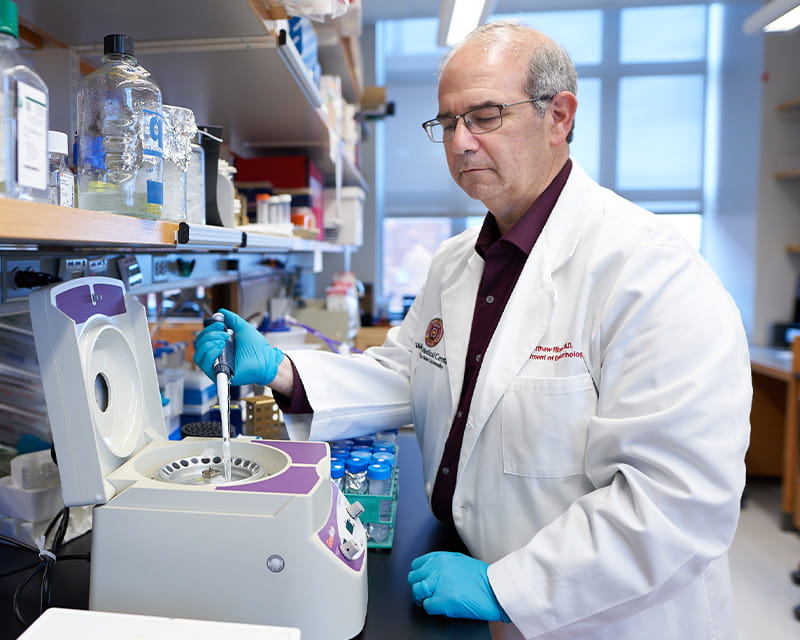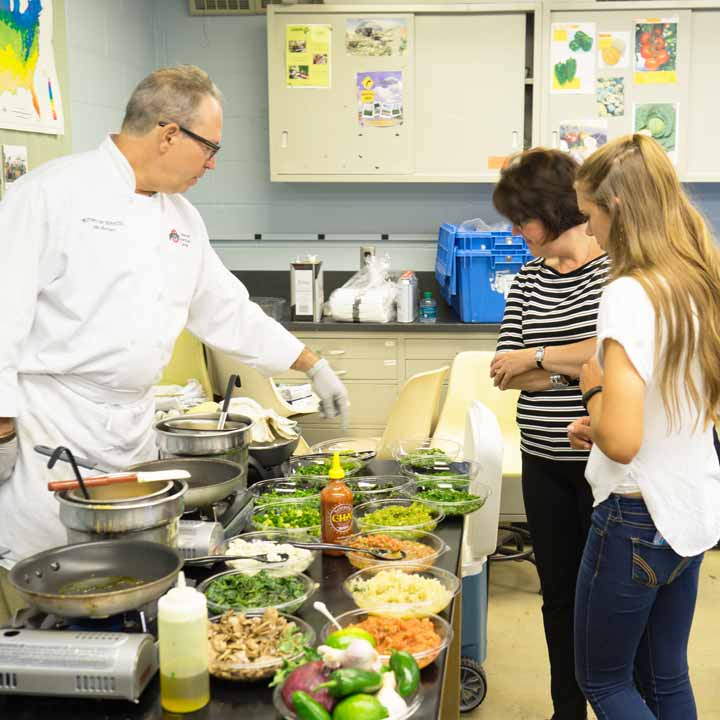
Studying “brake failure” in thyroid cancer metastasis
 The connection between diet and diabetes is well understood. However, as any endocrinologist knows, the ability to change patient habits can be challenging.
The connection between diet and diabetes is well understood. However, as any endocrinologist knows, the ability to change patient habits can be challenging.
“It’s one thing to talk about healthy diets and offer nutritious recipes,” says Jennifer Shrodes, RD, LD, CDCES. “Having a more action-oriented, hands-on approach can be a game changer.”
As a certified diabetes educator at The Ohio State University Wexner Medical Center, Shrodes has seen the impact of Cooking Matters for Diabetes, a six-week class for adults with type 1 or type 2 diabetes that includes food supplies for participants.
She’s also the co-author of a formal study on outcomes of Cooking Matters for Diabetes, along with senior study author Joshua Joseph, MD, MPH, FAHA, an endocrinologist and assistant professor in the Department of Internal Medicine at the Ohio State College of Medicine in the Division of Endocrinology, Diabetes and Metabolism.
Published online in the Journal of the Academy of Nutrition and Dietetics, the study tested whether a cooking intervention like Cooking Matters for Diabetes that provided food — along with diabetes self-management education to encourage healthy eating and physical activity — would improve A1C hemoglobin levels and diabetes management. The research team tracked class participation and disease outcomes of 48 adults with diabetes. Results indicate that the classes may be an effective method of improving diet-related self-care and health-related quality of life, especially among those living with food insecurity. The researchers recommend a larger study to reinforce these findings.
Cooking Matters for Diabetes was adapted from Cooking Matters, a program run by nonprofit Share Our Strength that addresses hunger and poverty, and the American Diabetes Association’s diabetes self-management education and support program. Local Matters, a Columbus nonprofit that works to create healthy communities through food education, access and advocacy, partnered in the design and delivery of the program, providing the culinary instructor, cooking equipment, food provisions and volunteers. Ohio State provided the community facility and certified diabetes care and education specialists.
The weekly classes included cooking demonstrations, along with lessons on diabetes and treatment options; healthy eating; physical activity; medication usage; monitoring and using patient-generated health data; preventing, detecting and treating acute complications; healthy coping with psychosocial issues and concerns; and problem solving. In addition, participants embarked on an interactive visit to a grocery store during one class.
The cooking portion provided education on food safety, knife techniques, nutrition facts and ingredient label reading, meal planning, budgeting and shopping. Each class, except the grocery store tour, involved participants cooking a meal in small groups. All participants then sat and shared the meal together, with the goal of building a sense of community.
“Placing class participants in real-world situations and actually seeing their level of cooking skills and nutrition awareness gave us tremendous insight as educators,” Shrodes says. “It provided so much more information about the challenges each patient might be facing.
“Some had never cooked at all, and many had very limited skills. Had we simply sent them home with recipes and no hands-on participation, we would have never addressed some of the real barriers to their long-term success. A person can learn what foods they should be eating, but if they don’t know how to prepare those foods or don’t have the tools or skills needed to make a recipe, all that nutrition awareness is of limited use. This more interactive approach means we’re able to see and address each barrier as we encounter them, and that can be a powerful way to help someone.”
As Shrodes explains, the ultimate goal of Cooking Matters for Diabetes was to improve overall food literacy. Teaching cooking skills is key, but so is food selection, meal planning, shopping, budgeting, food safety and nutrition.
Study results were traced based on participant surveys about their diabetes self-care activities along with medical health and outcomes surveys, diet history and a food security questionnaire. In addition, the participants’ A1C was measured at baseline, post-intervention and follow-up at three months.
“We found that study participants ate more vegetables and fewer carbohydrates. We saw improvements, including significant changes in diabetes self-management activities and numerical lowering of A1C among food-insecure study participants,” Shrodes says.
Offering additional insight on study results, Dr. Joseph says, “Many outcomes improved more substantially among individuals with food insecurity, compared to those without. However, during the postintervention follow-up period, the food-insecure group experienced greater regression, emphasizing the importance of sustained follow-up in populations made vulnerable related to one or more social determinants of health.”
Among the services available to help with this sustained follow-up are group and one-on-one classes developed by Ohio State physicians, nurses, dietitians and certified diabetic educators. Like Cooking Matters for Diabetes, these inpatient and outpatient diabetes education programs are designed to empower and support patients while providing information related to disease prevention, diabetes treatment and new technologies.